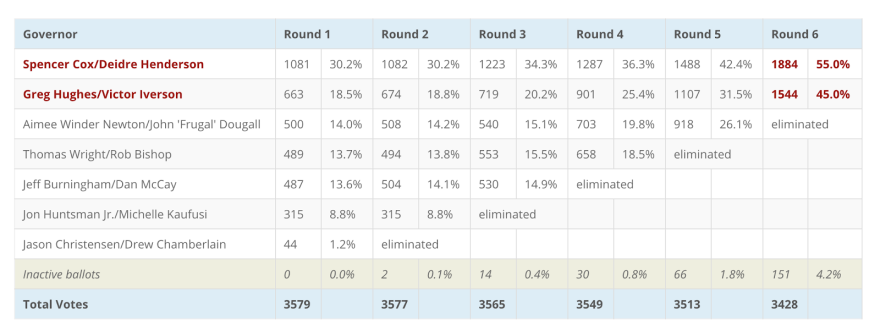Rep. Mike Winder, R-West Valley City, is running a bill to implement ranked-choice voting in all of Utah’s primary elections. He said it would help ensure a clear winner in elections with a lot of candidates on the ballot.
Winder pointed to the gubernatorial election last year as an example of why Utah needs to switch to ranked-choice. Four republicans ran in the primary, and then-Lt. Gov. Spencer Cox won with just 36% of the vote.
“We saw with the governor’s race rumors of write-in campaigns and other things because the winner of that primary didn’t have a majority,” he said. “Ranked-choice voting solves that problem.”
It allows people to list candidates in order of preference. When the votes are tallied, the candidate with the fewest first-place rankings is eliminated and their votes go to whoever was next on the ballot. That process is repeated until one candidate surpasses 50%.

The Utah Legislature authorized a pilot program for the voting method in 2018, and two cities in Utah county — Vineyard and Payson — used ranked-choice voting for their municipal elections the next year. Utah County Clerk Amelia Powers Gardner said those elections were easy to run, and 82% respondents who were surveyed said they would like to see ranked-choice voting continue.
But the state’s county clerks association, which includes every county clerk except Gardner, said ranked-choice voting won’t have a big effect on election outcomes in Utah.
In the past 465 races in Utah, only 5% were won with a plurality rather than a majority, according to Ricky Hatch, head of the association and the Weber County clerk. So ranked-choice voting would not have changed the outcomes of those elections.
In cities and states that are using ranked-choice voting — like San Francisco and Maine — Hatch said in 97% of cases the candidate who got the most first-place votes ended up winning the entire election. So ranked-choice voting changed the outcomes of only 3% of those elections.
He combined those percentages to come up with a prediction for the effect of ranked-choice voting in Utah.
“We're talking 0.15% of races [in Utah] would be impacted by rank choice voting, and that's just such a tiny amount for such a big change,” Hatch said.
But ranked-choice voting can influence elections without changing their outcomes, according to advocates like Gardner, who say it makes elections more civil because candidates have to appeal to voters beyond their base.
“It’s only a little bit more work, and to me it’s worth it to know the dialogue is better and the citizens feel more represented,” she said.
Winder’s bill requires $4,000 to upgrade election software and $500,000 dollars to educate voters. But it could result in future savings, according to Gardner, because it eliminates the need for run-off elections in places where a candidate must win by majority vote.




